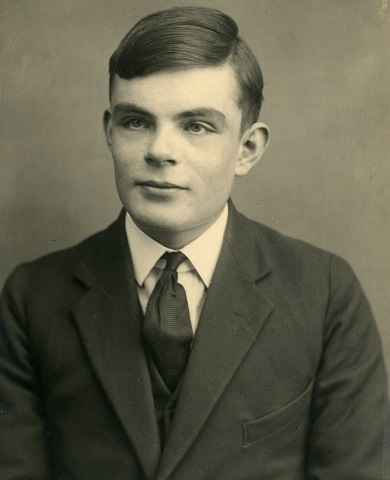Many have heard of Alan Turing, the mathematician and logician who invented modern computing in 1935. They know Turing, the cryptologist who cracked the Nazi Enigma code, helped win World War II. And they remember Turing as a martyr for gay rights who, after being prosecuted and sentenced to chemical castration, committed suicide by eating an apple laced with cyanide in 1954.
很多人都听说过艾伦·图灵(Alan Turing),知道他是一位数学家和逻辑学家,在1935年发明了现代计算。他们知道图灵是一位密码学家,破译了纳粹的Enigma密码,帮助同盟国赢得了第二次世界大战。他们还知道,图灵是同性恋权利的殉难者,在被起诉并被判处化学阉割后,他于1954年吃了一个涂有氰化物的苹果,自杀身亡。
But few have heard of Turing, the naturalist who explained patterns in nature with math. Nearly half a century after publishing his final paper in 1952, chemists and biological mathematicians came to appreciate the power of his late work to explain problems they were solving, like how zebra fish get their stripes or cheetahs get spots. And even now, scientists are finding new insights from Turing’s legacy.
但很少有人知道图灵是一位博物学家,他用数学来解释自然界的图案。在他1952年发表最后一篇论文后的近半个世纪里,化学家和生物数学家们开始意识到,他后期的工作可以用来解释他们正在解决的问题,例如,斑马鱼的条纹或猎豹的斑点是如何形成的。甚至到现在,科学家们还在从图灵的遗产中找到新的洞见。
Most recently, in a paper published Thursday in Science, chemical engineers in China usedpattern generation described by Turing to explain a more efficient process for waterdesalination, which is increasingly being used to provide freshwater for drinking and irrigation inarid places.
最近一次,在周四发表在《科学》杂志(Science)上的一篇论文中,中国的化学工程师利用图灵描述的斑图生成理论阐释了一种更有效的海水淡化处理方法。海水淡化正越来越多地被用于干旱地区的饮用水和灌溉用水供给。

Turing’s 1952 paper did not explicitly address the filtering of saltwater through membranes top roduce freshwater. Instead, he used chemistry to explain how undifferentiated balls of cells generated form in organisms.
图灵那篇1952年的论文没有明确提到,可以通过薄膜过滤盐水来产生淡水。他是用化学解释了没有明显差别的细胞球是如何在生物体中产生形状的。
It’s unclear why this interested the early computer scientist, but Turing had told a friend that he wanted to defeat Argument From Design, the idea that for complex patterns to exist in nature, something supernatural, like God, had to create them.
尚不清楚这为什么引起了这位早期计算机科学家的兴趣,但图灵曾对一位朋友说他想推翻目的论证,即自然界中存在的复杂图案一定是某种超自然的东西创造出来的,比如上帝。
A keen natural observer since childhood, Turing noticed that many plants contained clues that math might be involved. Some plant traits emerged as Fibonacci numbers. These were part of a series: Each number equals the sum of the two preceding numbers. Daisies, for example, had 34, 55 or 89 petals.
图灵从小就是敏锐的自然观察者,他注意到许多植物包含着可能与数学相关的线索。有些植物的性状中存在斐波那契数列。这个数列的一个特征是:每个数字等于前面两个数字的和。例如,雏菊有34、55或89个花瓣。
“He certainly was no militant atheist,” said Jonathan Swinton, a computational biologist and visiting professor at the University of Oxford who has researched Turing’s later work and life. “He just thought mathematics was very powerful, and you could use it to explain lots and lots of things — and you should try.”
“他当然不是一位激进的无神论者,”牛津大学(University of Oxford)的客座教授、计算生物学家乔纳森·斯温顿(Jonathan Swinton)说。他研究了图灵的后期工作和生活。“他只是认为数学非常强大,你可以用它来解释很多东西——你应该试一试。”
And try, Turing did.
图灵的确尝试了。
“He came up with a mathematical representation that allows form to emerge from blankness,” said Dr. Swinton.
“他提出了一种数学表达式,可以从无到有地生成形状,”斯温顿说。
In Turing’s model, two chemicals he called morphogens interacted on a blank arena. “Suppose you’ve got two of these, and one will make the skin of an animal go black and the skin of the animal go white,” explained Dr. Swinton. “If you just mix these things in an arena, what you get is a gray animal.”
在图灵的模型中,两种被他称作成形素(morphogen)的化学物质在一个空白区域相互作用。“假设你有两种成形素,一种会让动物的皮肤变黑,另一种会让动物的皮肤变白,”斯温顿博士。“如果把它们混合在一起,动物的皮肤就会变成灰色。”
But if something caused one chemical to diffuse, or spread, faster than the other, then eachchemical could concentrate in evenly spaced localized spots, together forming black andwhite spots or stripes.
但如果某种原因导致一种化学物质扩散得比另一种快,它们就会集中在间隔均匀的局部区域,形成黑色和白色的斑点或条纹。
This is known as a “Turing instability,” and, the Chinese researchers who published the new paper determined that it could explain the way shapes emerged in salt-filtering membranes.
这被称作“图灵不稳定性”。发表这篇新论文的中国研究人员断定,它可以解释盐过滤膜中出现的结构。
By creating three-dimensional Turing patterns like bubbles and tubes in membranes, there searchers increased their permeability, creating filters that could better separate salt from water than traditional ones.
通过在膜上制造气泡和管道等三维图灵结构,研究人员增加了它们的渗透性。这种过滤器能够比传统过滤器更好地分离盐和水。
“We can use one membrane to finish the work of two or three,” said Zhe Tan, a graduate student at Zheijang University in China and first author of the paper, which means less energy and lower cost if used for large-scale desalination operations in the future.
“我们可以用一张膜完成两到三张膜的工作,”浙江大学的研究生谭喆说。他是该论文的第一作者。这意味着如果将来用于大规模的脱盐作业,消耗的能源和成本都会降低
